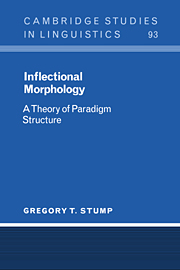
-
Select format
-
- Publisher:
- Cambridge University Press
- Publication date:
- October 2009
- February 2001
- ISBN:
- 9780511486333
- 9780521780476
- 9780521024228
- Dimensions:
- (228 x 152 mm)
- Weight & Pages:
- 0.65kg, 328 Pages
- Dimensions:
- (228 x 152 mm)
- Weight & Pages:
- 0.487kg, 328 Pages
You may already have access via personal or institutional login- Series:
- Cambridge Studies in Linguistics (93)
Book description
A new contribution to linguistic theory, this book presents a formal framework for the analysis of word structure in human language. It sets forth the network of hypotheses constituting Paradigm Function Morphology, a theory of inflectional form whose central insight is that paradigms play an essential role in the definition of a language's system of word structure. The theory comprises several unprecedented claims, chief among which is the claim that a language's realization rules serve as clauses in the definition of a paradigm function, an overarching construct which is indispensable for capturing certain kinds of generalizations about inflectional form. This book differs from other recent works on the same subject in that it treats inflectional morphology as an autonomous system of principles rather than as a subsystem of syntax or phonology and it draws upon evidence from a diverse range of languages in motivating the proposed conception of word structure.
Contents
Metrics
Altmetric attention score
Full text views
Full text views help Loading metrics...
Loading metrics...
* Views captured on Cambridge Core between #date#. This data will be updated every 24 hours.
Usage data cannot currently be displayed.
Accessibility standard: Unknown
Why this information is here
This section outlines the accessibility features of this content - including support for screen readers, full keyboard navigation and high-contrast display options. This may not be relevant for you.
Accessibility Information
Accessibility compliance for the PDF of this book is currently unknown and may be updated in the future.


